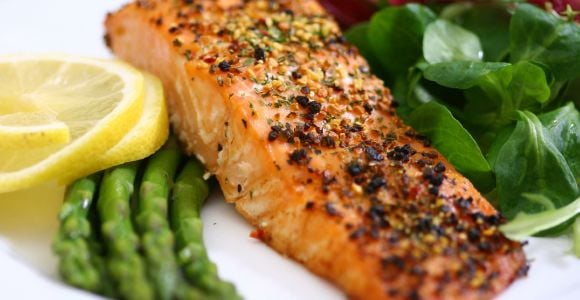Have you ever considered that what you eat can affect how you feel? Researchers have been studying the food-mood connection for some time now and the results may surprise you. Certain foods can significantly affect your mood, some positively and some negatively. A healthy diet may be just as effective as other mood-boosting remedies, including exercise, stress reduction, adequate sleep, and mood-lifting medications. This brings a whole new meaning to the phrase, "you are what you eat."
Eat More of These
Clinical studies have shown that certain nutrients, including omega-3 fats, B vitamins, vitamin D, and certain proteins are associated with an enhanced mood.
Omega-3 Fatty Acids
A growing body of research indicates that omega-3 fatty acids may help boost your mood and treat symptoms of depression. To get more omega-3 fats, try adding in more fatty fish (such as salmon, tuna, mackerel, herring, trout, and sardines), walnuts, flaxseeds, canola oil, and fortified eggs.
B Vitamins
According to researchers, certain B vitamins--most notably vitamin B12 and folate--can cheer you up by helping your body produce more serotonin, a neurotransmitter responsible for stabilizing mood. In fact, low amounts of these disposition-lifting nutrients have been linked to depression. Load up on foods rich in these two B vitamins, including oats, whole-grains, broccoli, beets, lentils, beans, seeds, greens, eggs, shellfish, beef (choose lean cuts), and dairy products.
Vitamin D
Studies have suggested that this "sunshine vitamin" may really brighten your outlook by upping levels of serotonin, a feel-good neurotransmitter. Perk up your day by consuming eggs, fortified low-fat and fat-free dairy products, fortified soy products, and fatty fish with bones.
Eat Less of These
Refined Carbohydrates
Concentrated sugars from candy, soda, juice, and other sweets cause your blood sugar to spike rapidly and then drop quickly, much like a roller coaster. Limit these foods, as well as refined carbohydrates such as white breads, white rice, crackers, and regular pasta, which are digested and absorbed very quickly.
Trans Fat
Preliminary research has found a link between trans-fatty acid intake and biological changes that lead to depression. It's believed that these unhealthy fats cause inflammatory responses in your body that can interfere with mood-boosting neurotransmitters. Avoid packaged pastries and crackers and fast food.
Other Tips
The key to ensuring you're as chipper as can be is to take steps to keep your blood sugar stable throughout the day. Make sure to eat something about every four or five hours, which will prevent your blood sugar from plummeting. Constant fluctuations in your blood sugar can cause mood swings and fatigue. Strive to consume protein and complex carbohydrates at each meal and snack to keep your blood sugar steady. Lean proteins, such as chicken, tuna, and turkey, are good sources of the amino acid tyrosine, which can enhance the mood-boosting neurotransmitters dopamine and norepinephrine.
Stay well-hydrated with plenty of water and other low-calorie beverages, and avoid overdoing it on caffeinated beverages, which may give you a quick burst of energy but leave you feeling tired and sluggish later.
Get Moving
Research has proven that exercising regularly can help ward off depression. Every little bit helps--a mere thirty minutes of daily physical activity can decrease symptoms of mild to moderate depression by upwards of 50 percent.
What About Supplements?
It's always best to get your nutrients from food rather than from supplements. And as always, talk with your physician before beginning any type of dietary supplement.
The Bottom Line
Adequate sleep, stress reduction, regular exercise, and a well-balanced diet that's rich in fruits, vegetables, whole-grains, lean proteins, and healthy fats are all important for staying positive.
Kari Hartel, RD, LD is a Registered, Licensed Dietitian and freelance writer based out of St. Louis, MO. Kari is passionate about nutrition education and the prevention of chronic disease through a healthy diet and active lifestyle. Kari holds a Bachelor of Science in Dietetics from Southeast Missouri State University and is committed to helping people lead healthy lives. She completed a yearlong dietetic internship at OSF St. Francis Medical Center in Peoria, IL, where she worked with a multitude of clients and patients with complicated diagnoses. She planned, marketed, and implemented nutrition education programs and cooking demonstrations for the general public as well as for special populations, including patients with cancer, heart disease, diabetes, Alzheimer's disease, obesity, and school-aged children. Contact Kari at [email protected].



